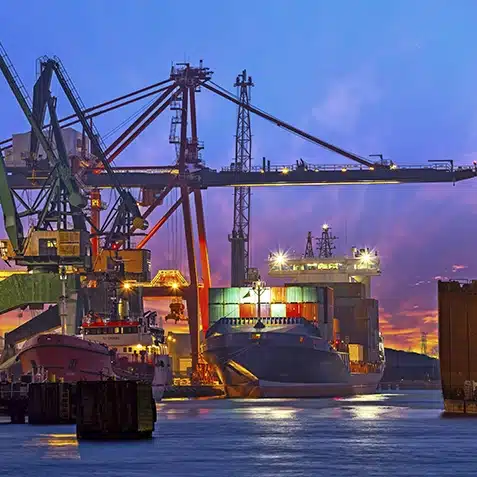Technical Ship Management Course
Diploma in Technical Ship Management
Technical Ship Management
Maritime Training Academy’s Technical Ship Management Diploma delivers advanced training in vessel operations, maintenance planning, dry-docking and regulatory compliance.
Designed for chief engineers, superintendents and ship operations staff, this course supports progression into shore-based technical management and ship support roles.

Professional Ship Management Qualification
Gain the skills to manage vessel performance, coordinate maintenance schedules and oversee safety and compliance across commercial fleets.
Contact us below to enrol today, or speak with our experienced course advisors.

Duration:
12 - 18 months
Learn at your own pace
Online Course:
Study from anywhere

Cost:
Diploma: £3,195
Certificate: £2,295

Recognised by: 
Technical Ship Management Diploma vs Certification
Choose the right path for your career:
Comprehensive Training: In maintenance planning, dry docking, superintendent duties, vessel performance monitoring and ISM/SOLAS/IMO compliance.
Flexible Study Duration: 12 – 18 month depending when you enrol to the program, study online at your own pace, from anywhere in the world.
Marine Industry Career Opportunities: 100% Online, with access to our student learning portal
Long-Term Career Impact: Technical Superintendent, Fleet Maintenance Manager, Vessel Operations Supervisor, Marine Engineering Coordinator.
Global Recognition: Our Diplomas are recognised by the University of Portsmouth and are supported by industry associations.
Assignments: One assignment is required to be completed and submitted at the end of each module, based on that particular subject.
Certification: you will receive a PDF Digital certificate (Printed Certificate Completion Pack available).
Final Examination: There will be a final examination upon completing and submitting all student assignments (exams are sat in April or October).
Post-Nominal letters: On passing the Diploma you can also use these letters after your name: MTA Dip TSMan
Digital Course Badge: Upon successful completion students will receive an exclusive course badge for use on business cards, LinkedIn profiles and website(s)!
Diploma - £3,195
A globally recognised qualification for careers in ship maintenance management, technical operations and vessel performance oversight.
✔
✔
✔
✔
✔
✔
✔
✔
✔
✔
Certificate - £2,295
Specialist Technical Ship Management Training without formal assessments, for those who do not require a recognised diploma.
✔
✔
✔
✔
✔
✔
✔
Technical Ship Management Curriculum: 8 Modules, plus 1 Specialist Module
Training covers the full scope of technical ship management — from dry dock planning and budget control, to class surveys and onboard system maintenance.
You’ll develop the tools to monitor vessel condition, manage contractors and ensure compliance with international marine regulations.
1. The Shipping Industry and the Role of the Superintendent
- The function of international shipping
- International regulation of shipping
- Flag states
- Classification societies and the role of class
- Industry organisations and information sources
- Shipping company organisation
- Role of the superintendent
2. Quality Assurance – Safety and Security
- Quality assurance
- Safety, security, health and environment
- Port state control
3. Essential Commercial and Shipping Law
- Law of contract
- Law of Tort (negligence)
- Liability in Contract and Tort
- International Maritime Law
- Flag State Law
- Collision and wreck removal
- Pollution
- Carriage of goods by sea
- Chartering and charterparties
- Pilotage
- Marine Insurance
- Ship sale and purchase documentation
4. Maintenance and Docking
- Compliance with international convention
- Classification Society compliance
- Principles of ship maintenance
- Planned maintenance
- Spares control
- Budgeting
- Monitoring ship performance
- Bunkering and bunker quality
- Vibration analysis
- Lubricating oil analysis
- Drydocking
- Corrosion and paint systems
- New building specifications, contracts and plans
- Touch typing
5. Finance Considerations
- Preparing an annual budget
- Monitoring cost against budget
- Cost controls
- Docking cost budget
- Purchasing
- Spares and logistics
- Monitoring of cost
- Critical equipment
- Audit
- Value Added Tax
- Bribery Act
- Anti money laundering
6. The Ship Life Cycle
- Registration of ship
- Purchase, sale, take over and delivery
- Ship recycling
- Inspections
7. Project Management and Reporting
- Project phases
- Work breakdown structure
- Objectives
- Deliverables
- Project planning
- Budget and financial planning
- Risk management
- Issue management
- Configuration management
- Quality management
- Project monitoring and reporting
- Change control
- Project library
8. Emergency Preparation and Response
- An introduction of emergency preparation and response
- Preparation and planning
- Communication
- Emergency organisation
- Training and drills
- Media
Specialist Module - Marine Superintendent
- Cargo Carriage
- Personnel
- Marine Insurance and law
- Accidents and incidents
- Information capture and reporting
- Records
- Chartering
- Control of operations
- Trim, stability and longitudinal strength
- Nautical equipment
Specialist Module - Technical Superintendent
- Hull
- Materials
- Machinery
- Electrical safety
- Control systems
- Technical equipment
Hear from our Students
Meet the Course Director
Ian Biles
Managing Director at Maritime Services International
Ian has led MSI to become one of the world’s leading surveying companies. Ian’s qualifications include: Master Mariner, RYA Yachtmaster Ocean, Naval Architect (BEng Ship Science) and Business Management (MA Business Management).
Practically Ian has attended numerous shipyards throughout the world for new building, ship repair and ship conversion including extended periods in both Singapore (Jurong) and Dubai (Dubai World) together with dockings in Mexico, Romania, Turkey, China, Bulgaria, Greece, Germany, France, Egypt, Itally, Spain, Gibraltar, Malta, Cuba, Portugal and the UK.

Technical Ship Management Course FAQs
Find out more about the course with our FAQs below.
How do I become a technical ship manager or superintendent?
Start by gaining a recognised qualification in technical ship management such as this one. Our diploma covers dry dock planning, vessel operations and regulatory oversight ideal for chief engineers or deck officers moving into technical management roles.
What qualification will I receive from this course?
You’ll earn a Diploma in Technical Ship Management from the Maritime Training Academy, recognised by fleet operators, ship owners and classification societies worldwide.
Is this course suitable for superintendents and senior engineers?
Absolutely. It’s designed for professionals with seagoing or technical experience looking to move into shore-based or fleet-wide management roles.
How much does a technical superintendent earn?
Typical salaries range from £50,000 to £90,000 depending on fleet size, region and seniority. Project-based or international roles often pay more.
Does this course cover dry docking and maintenance planning?
Absolutely. You’ll learn how to schedule, budget and manage dry dock repairs, surveys and overhauls in compliance with class and flag requirements.
Can I take this course without marine engineering experience?
Some prior shipboard or technical knowledge is recommended, but the course is also suitable for motivated professionals transitioning from operations or commercial roles.
See our FAQ page for more questions answered about MTA courses.
Supported by:



Why Choose The Maritime Training Academy?

Flexible
Online learning allows you to study in your own time, at your own pace from anywhere in the world. This saves on travel and classroom costs and allows you to fit your studies around your job and progress your career.

Supportive
While the nature of distance learning is independent study, we recognise the importance of support. Students can contact us at any time during their course for assistance and our team of industry experts are always on hand for advice.

Expertise
We have over 50 industry experts writing, developing and advising on our course material. We truly believe that allowing students to tap into their expertise and knowledge is of the utmost importance to fulfil your dream career.
If you would prefer to complete this as a classroom-based course, please contact us.
